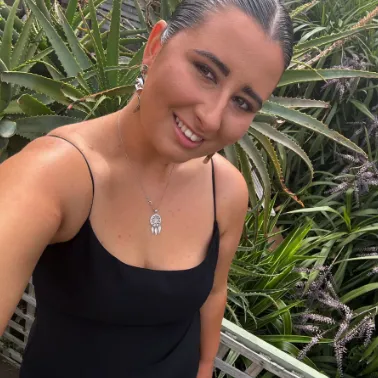
Chloe
I was diagnosed on the 28th of June, 2023, with Hodgkin Lymphoma (HL). It was one week after my surgical biopsy. I went in for my appointment, but unfortunately, the test results weren’t in. They knew it was definitely cancer, but they couldn’t confirm it without the results.
3–4 hours after my appointment, I received a phone call—the results were in, and I was officially a cancer patient.
Before treatment, I struggled with extreme fatigue and uncontrollable itching. Both just took over my life. I couldn’t work or function because I was so exhausted, and at night, when I tried to relax, my legs would itch like mad.
Being diagnosed at my age was terrifying, yet I somehow always kept positive. I was the happiest I’d ever been up until my diagnosis. I finally had a decent job with great hours, an amazing group of friends, and was simply enjoying life. Having cancer, though, did unfortunately end a few friendships—not by anyone’s fault, of course. Not everyone’s prepared to support or be there for you, especially at this age, and that’s okay.
Everyone my age was out enjoying life, going to festivals, concerts, and other fun events while I was either sick in bed or in the hospital.
I received two cycles of ESC BEACOPP and then two cycles of ABVD (which quickly turned into AVD due to shortness of breath). Throughout treatment, I was one of the unlucky ones, you could say. I had severe nausea, couldn’t eat, and couldn’t drink. I eventually ended up with a Niki pump for constant anti-nausea meds to manage it.
Bone pain was also something I was not prepared for—constant, severe pain in my lower back, hips, and femurs. The staff did everything they could to ease it, but it was still excruciating. These two symptoms were what mostly kept me as an inpatient throughout my treatment.
I also had an episode of febrile neutropenia—the one thing all cancer patients are terrified of. I experienced the common side effects, too, like headaches, fatigue, shortness of breath, and neuropathy.
Being an inpatient for so much of my treatment wasn’t as bad as it might sound. Most of my nurses were my age, and the care and support they provided was amazing. It was hard not being able to do the things that are normal for people my age, but I just had to keep reminding myself that it would get better.
After treatment, things were a bit rocky. The nausea lingered, my shortness of breath affected me greatly, and the fatigue wouldn’t go away. Thankfully, after six to seven months, those symptoms started to subside, and I can now say I rarely feel any of them.
I was very lucky to have the Andrew Love Cancer Centre here in Geelong, which made my treatment very accessible.
I had an amazing support system, so a lot of the challenges didn’t really hit me until after treatment was over. That’s when my emotional and mental health took a downturn. Thankfully, I was able to access psychological help straight away.
After treatment, I struggled with my physical appearance and health. I looked different, had gained a lot of weight, and was very weak. It took time and patience, but with the help of my GP, exercise physiologist, and Haem team, I eventually reached a point where I was happy. I’m still working on getting stronger and happier every day.
Financially, I struggled for a bit. It’s not quick or easy to get onto Centrelink for a medical exemption from work. I was unable to work, had used up all my leave, and didn’t know what to do. After treatment, I wasn’t physically or mentally fit to return to work. But with the support of my family and doctors, I was able to stay on an exemption for as long as it took to feel ready to work again.
My medical team told me about Lymphoma Australia straight away. The patient treatment pack was amazing! It was so useful, and it felt nice to receive it at the start of treatment. (Those ginger lollies are amazing, and that thermometer is a lifesaver—literally.)
My Advice
Lean on your family and friends and take all the help that’s offered! Always remember to put yourself first—this is your time to be selfish and look after yourself. Listen to your doctors, but always express concerns and tell them about your side effects. Don’t suffer in silence—they may be able to help!
I’m happy to say that I’m now in remission, and I’m feeling stronger every day.
This story was published with the consent of Lymphoma Australia Association
